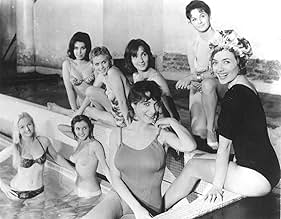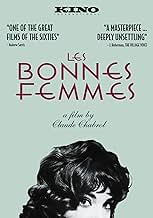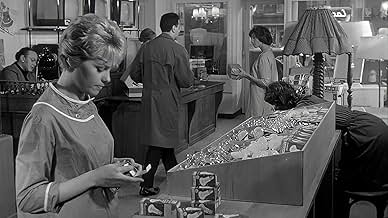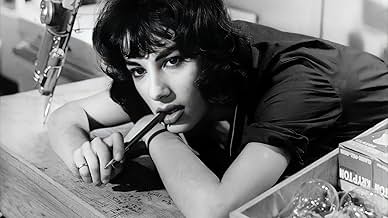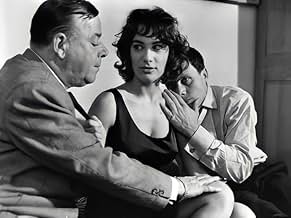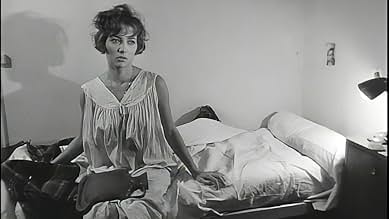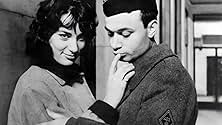NOTE IMDb
7,2/10
3,3 k
MA NOTE
Ajouter une intrigue dans votre langueFour Parisian women navigate the world of romance and daily life looking to fulfill their dreams but often find real-life to be inescapable.Four Parisian women navigate the world of romance and daily life looking to fulfill their dreams but often find real-life to be inescapable.Four Parisian women navigate the world of romance and daily life looking to fulfill their dreams but often find real-life to be inescapable.
- Réalisation
- Scénario
- Casting principal
- Récompenses
- 1 nomination au total
Gabriel Gobin
- Le père d'Henri
- (as Gabriel Gobain)
Avis à la une
i liked this film. it has an ambigious quality about it, almost paradoxical. it has a feel of a documentary and is observational in nature, yet there is a obvious message or view taken by chabrol and the women in this film. they're doomed objects of desire for men. the women have this elusive quality about them, they're beautiful and somewhat misguided about the men in thier lives. they seem unattainable, yet vulnerable to a ominous unspoken danger that awaits them that is denoted by the music. there's this creepy yet mysterious sounding music that runs through the film when the female characters roam through the streets. and for some reason, all the men in this movie are misogynist jerks! they disrespect these women and believe they're entitled to them. yet, these women flirt with them and passively resist them for most of the film. chabrol lovingly shoots these women and has affection for them, but also sadness at their romantic naivety about the men in their lives that will bring them doom.
Les bonnes femmes (1960), directed by Claude Chabrol, was shown in the U.S. with the title The Good Time Girls. The film depicts the lives of four Parisian shopgirls. (I guess now we would call them retail clerks, but in 1960 they were shopgirls.)
The women are all looking for romance, and they do no one any harm, but their lives are not filled with the glamor and excitement that the term "good time girls" evokes. They go to music halls, public swimming pools, and the zoo. They let men cruising by in cars pick them up. They stay out all night and stumble half asleep into work the next day. One of them is pursued and courted by a mysterious motorcyclist.
All four young women are attractive. Three of them went on to have important careers in the French cinema--Bernadette Lafont , Clotilde Joano, and Stéphane Audran. (Audran later married director Chabrol,)
Although Chabrol is a superb director, and the actors are talented, the film just didn't work for me. The young women had vacant lives, they had no aspirations or dreams of something different, and they had a naiveté that was sad rather than charming.
This is a movie worth seeing if you have a particular interest in the French New Wave, in Claude Chabrol, or in the young actors who were not yet major stars. I wouldn't seek it out as casual viewing. We saw it on VHS, and it worked well on the small screen.
The women are all looking for romance, and they do no one any harm, but their lives are not filled with the glamor and excitement that the term "good time girls" evokes. They go to music halls, public swimming pools, and the zoo. They let men cruising by in cars pick them up. They stay out all night and stumble half asleep into work the next day. One of them is pursued and courted by a mysterious motorcyclist.
All four young women are attractive. Three of them went on to have important careers in the French cinema--Bernadette Lafont , Clotilde Joano, and Stéphane Audran. (Audran later married director Chabrol,)
Although Chabrol is a superb director, and the actors are talented, the film just didn't work for me. The young women had vacant lives, they had no aspirations or dreams of something different, and they had a naiveté that was sad rather than charming.
This is a movie worth seeing if you have a particular interest in the French New Wave, in Claude Chabrol, or in the young actors who were not yet major stars. I wouldn't seek it out as casual viewing. We saw it on VHS, and it worked well on the small screen.
Chabrol's career is often seen as moving from the naturalism of his early films to the extreme stylisation of his great mid-period. It's not as simple as that, but in 'Les Bonnes Femmes', Chabrol achieves a balance between the two that he has rarely equalled. The story of four shopgirls, their work and social lives, has all the plotless and poignant banality of realism, while the closing third, with its move from Paris to the country, its seducer-cum-motorbike-riding-devil (reg. no.: 666) talking about the Creator, as little schoolboys called Balthasar pass by; and its closing vision of Hell/Purgatory bespeak a more Cocteau-like world of mythology and religion. But there is Cocteau too in the framing of Jacqueline in the shop window, while Chabrol's filming of treacherous nature later on is uncommonly vivid. Although 'Bonnes' is his least typical film, it is also his most lovable, and seems to get richer with the years.
Just to prove that portraying males as all-negative is nothing new, see Les Bonnes Femmes: the employer with wandering hands, the drippy suitor, his bossy Dad, the snobbish fiancé, the lurking psycho, the bad-jokes bully-boy and his fatty hanger-on, the absent lad on national service. Every one of them is no good. And yet the four shop-assistants are no better, they exist only for the men. Whatever the fellows throw at them, they're up for it. It's a chilling worldview, with a cynical twist at the end, (plus a tacked-on coda that seems to be from another movie). Along the way, there's some really hammy acting from the girls' employer that clashes badly with the realistic mood, and some longueurs as the girls get bored at work and we get bored right along with them. The young Bernadette Lafont is a joy, but she fades out in Reel Three when the lovely Clotilde Joano comes to the fore. Whatever happened to Clotilde? Her subsequent career was undistinguished, and she died at age 42. This is mostly a watchable slice of Paris life from the late 50s, although the Algerians who caused so much mayhem only a few years later are nowhere to be seen.
The film's English title "The Good Time Girls" capture the essence of the film--four different women, working in a shop, moonlighting as they are not rich, and hoping to find a decent spouse. The shop itself presents the lecherous owner (who "keeps his distance") and an elderly cashier who hides her interest in BDSM (her fetish is a cloth dipped in the blood of a BDSM convict who was guillotined, with an insinuated relationship with a customer who asks her for money and gets it!), a beautiful Stephane Audran (moonlighting as a singer), and the attractive Clotilde Joano. And there is a murder, which hangs in the air without the outcome discussed further--one of the weak points of the over-rated film.
Le saviez-vous
- AnecdotesCaused so much resentment among the public upon its release that some went as far as breaking seats in theaters as sign of protest.
- GaffesAfter Ernest strangles Jacqueline, he rips his coat out from under her and flips her over. The supposedly dead Jacqueline immediately moves her arm to catch herself from going face first into the mud.
- Citations
Monsieur Belin: My pleasure in life is to reprimand little girls... It's my prerogative.
- ConnexionsFeatured in Le fils de Gascogne (1995)
Meilleurs choix
Connectez-vous pour évaluer et suivre la liste de favoris afin de recevoir des recommandations personnalisées
- How long is The Good Girls?Alimenté par Alexa
Détails
Box-office
- Montant brut aux États-Unis et au Canada
- 6 578 $US
- Week-end de sortie aux États-Unis et au Canada
- 6 578 $US
- 15 août 1999
- Durée
- 1h 40min(100 min)
- Couleur
- Rapport de forme
- 1.66 : 1
Contribuer à cette page
Suggérer une modification ou ajouter du contenu manquant

